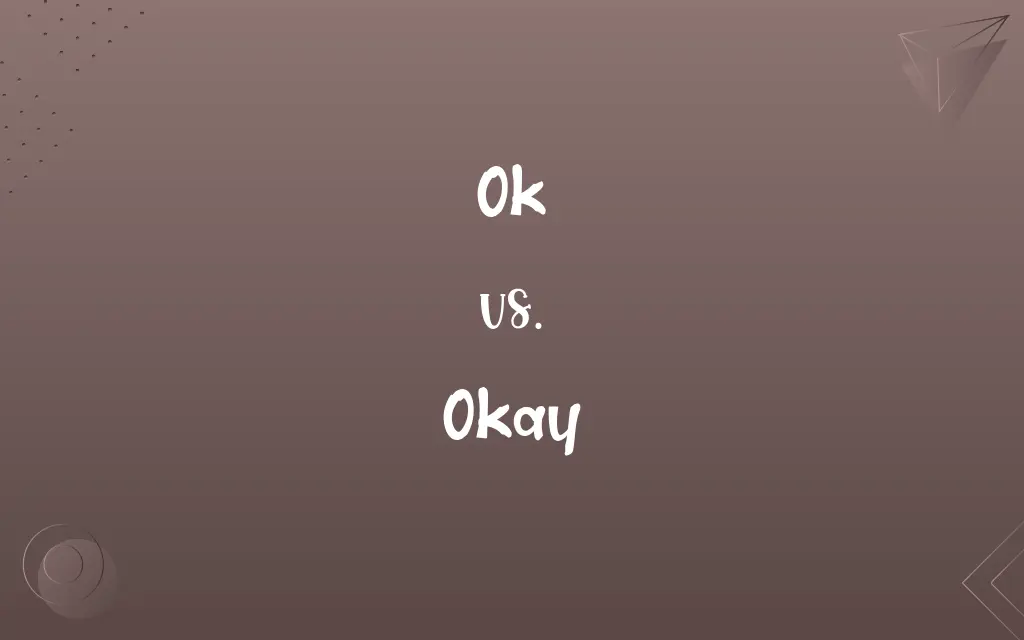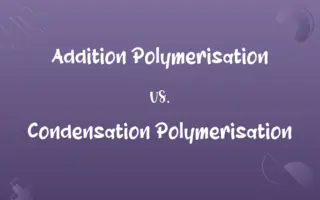Ok vs. Okay: Know the Difference

By Hifza Nasir & Dua Fatima || Published on July 26, 2024
"Ok" is a casual, shorter form for agreement or acceptance, while "Okay" is its formal counterpart, used for clarity in writing and speech.

Key Differences
"Ok" is often used in informal contexts, such as texting or casual conversation, indicating agreement or that something is satisfactory. "Okay," on the other hand, is more likely to appear in formal writing or speech, offering a clearer form of acceptance or approval.
Hifza Nasir
Jul 26, 2024
Both "Ok" and "Okay" serve similar functions in communication, signaling consent or that conditions are acceptable. However, "Okay" might be preferred in professional or academic settings to ensure clarity.
Dua Fatima
Jul 26, 2024
The choice between "Ok" and "Okay" can also reflect the medium of communication. "Ok" is common in digital communication, like chats or emails, due to its brevity. "Okay" might be chosen for more deliberate communication, such as in letters or formal announcements.
Hifza Nasir
Jul 26, 2024
Despite their differences in formality and context, both terms are universally understood and interchangeable in many situations. The preference often comes down to personal style or the tone one wishes to convey.
Hifza Nasir
Jul 26, 2024
The evolution of "Ok" into "Okay" reflects the dynamic nature of language, where variations emerge based on usage patterns. Both forms have been embraced in English, showcasing the language's adaptability.
Hifza Nasir
Jul 26, 2024
ADVERTISEMENT
Comparison Chart
Variability
Less variable, usually a quick assent
More variable, can convey nuanced acceptance or conditionality
Dua Fatima
Jul 26, 2024
ADVERTISEMENT
Ok and Okay Definitions
ADVERTISEMENT
Okay
In a satisfactory or adequate manner;
She'll do okay on her own
Held up all right under pressure
Hifza Nasir
Jan 12, 2024
Okay
Being satisfactory or in satisfactory condition;
An all-right movie
The passengers were shaken up but are all right
Is everything all right?
Everything's fine
Things are okay
Dinner and the movies had been fine
Another minute I'd have been fine
Hifza Nasir
Jan 12, 2024
Repeatedly Asked Queries
Can "Ok" and "Okay" be used interchangeably?
Yes, in many contexts, but "Okay" might be better in formal settings.
Hifza Nasir
Jul 26, 2024
Is there a difference in meaning between "Ok" and "Okay"?
The meaning is essentially the same, but the context and formality level may influence choice.
Hifza Nasir
Jul 26, 2024
Is "Ok" acceptable in formal writing?
Generally, "Okay" is preferred in formal writing for clarity.
Dua Fatima
Jul 26, 2024
Can "Ok" be seen as less polite than "Okay"?
In some cases, yes, especially in formal or professional communication.
Hifza Nasir
Jul 26, 2024
How did "Ok" and "Okay" originate?
Both originated from the abbreviation "OK," which is a misspelled abbreviation for "oll korrect," a humorous take on "all correct."
Hifza Nasir
Jul 26, 2024
Is one more modern than the other?
"Ok" is often seen as more modern, especially in digital communication.
Hifza Nasir
Jul 26, 2024
Are there situations where "Ok" is preferred over "Okay"?
Yes, especially in informal texts or quick conversations.
Dua Fatima
Jul 26, 2024
Do "Ok" and "Okay" have the same pronunciation?
Yes, they are pronounced the same.
Dua Fatima
Jul 26, 2024
Is "Ok" informal in all languages?
Its informality is recognized in many languages, but usage norms can vary.
Shumaila Saeed
Jul 26, 2024
Can "Okay" imply more agreement than "Ok"?
Not necessarily, but it can convey a more formal or deliberate agreement.
Hifza Nasir
Jul 26, 2024
Are there other variations of "Ok" and "Okay"?
Yes, variations like "OK," "O.K.," and "okay" reflect personal or regional preferences.
Dua Fatima
Jul 26, 2024
Is "Okay" more professional than "Ok"?
Yes, "Okay" is often considered more professional and clear.
Shumaila Saeed
Jul 26, 2024
Is the spelling "Okay" more universally understood?
Both are universally understood, but "Okay" may be clearer to non-native speakers.
Hifza Nasir
Jul 26, 2024
Does "Okay" appear in formal documents?
Yes, it can appear in formal documents where clarity and formality are prioritized.
Dua Fatima
Jul 26, 2024
Is it okay to use "Ok" in emails?
Yes, especially in informal or internal communications, but "Okay" might be preferred for clarity in formal emails.
Dua Fatima
Jul 26, 2024
Share this page
Link for your blog / website
HTML
Link to share via messenger
About Author
Written by
Hifza NasirCo-written by
Dua Fatima






































































